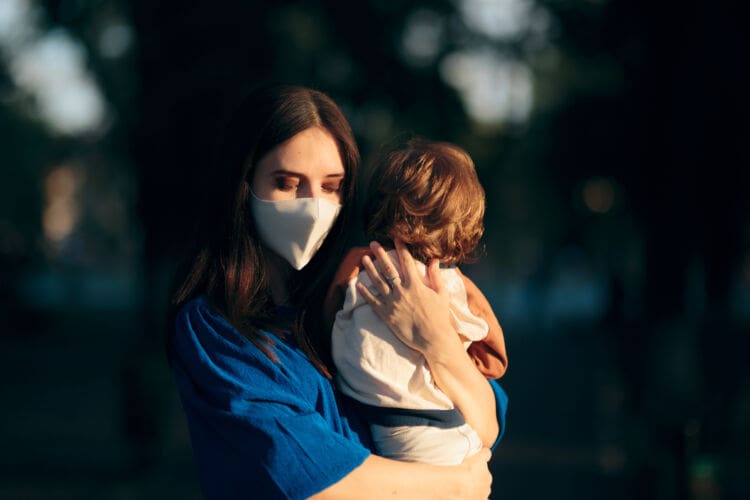In this article
Fabricated or induced illness, also known as factitious disorder, refers to a situation where a person intentionally produces, exaggerates, or induces symptoms of illness in themselves or another person. This is most commonly seen in a parent or carer fabricating or causing illness in a child.
Unlike malingering, where symptoms are faked for a clear external benefit, the motivation in fabricated illness is usually psychological. It may be driven by a need for attention, care, or validation. These cases are complex, difficult to detect, and often emerge in healthcare or safeguarding contexts.
Fabricated illness is considered rare, but recent data published by Cerebra suggests that allegations are more common than previously thought with at least 74% of children’s services departments had experienced allegations of fabricated illness. However, in 84% of cases, allegations resulted in no follow-up action.
What is a fabricated illness?
Fabricated illness is a form of abuse where a person deliberately misleads others by claiming someone, usually a child is unwell when they are not. This can involve:
- Falsifying medical history or symptoms.
- Manipulating tests or clinical observations.
- Inducing symptoms through medication, injury, or withholding care.
The person responsible may appear highly attentive and involved in the child’s care. They often push for repeated medical investigations or treatment and may move between health providers to avoid scrutiny.
The behaviour can result in unnecessary medical procedures, harm to the child, and significant distress. In professional settings, it requires a coordinated response from health, education, and safeguarding services. Early identification is difficult but essential to protect those affected.

Signs of fabricated illness
Signs of fabricated illness can vary, but there are some patterns professionals can look for, which often appear during medical or safeguarding assessments.
Common indicators include:
- Discrepancy between reported and observed symptoms- this means that symptoms reported by the parent or carer don’t match clinical findings. The child may appear well when observed.
- Repeated, unexplained medical issues – the child is often presented to doctors or emergency services with recurring or unusual problems that aren’t medically explained.
- Excessive medical investigations or treatments – the child may undergo numerous tests, procedures, or even surgeries without clear justification.
- Symptoms only occur in the presence of the parent or carer – illnesses tend to appear or worsen when the child is with the adult and improve in their absence.
- The parent appears unusually knowledgeable or focused on medical detail – they may insist on certain tests or push for specific diagnoses, often showing distrust in medical professionals.
- Frequent changes in GP or medical provider – this can be an attempt to avoid detection or restart the cycle of concern.
- Interference with clinical care – the parent might tamper with samples, withhold medication, or exaggerate symptoms to staff.
- Unusual illness history in siblings – there may be a pattern of unexplained or severe illness in other children in the family.
- The child may show signs of anxiety or speak little about their illness – children often don’t describe the same symptoms as the adult and may seem confused or anxious about what is being said.
These signs don’t confirm fabricated illness on their own, they form part of a broader picture that requires careful multi-agency assessment. A multi-agency assessment is a coordinated process where professionals from different sectors work together to assess a child’s needs, risks, and family situation. It’s used when concerns about a child’s welfare or safety are too complex for one service to assess alone. This kind of assessment is common in cases involving fabricated illness, where information needs to be gathered from health, education, social care, and sometimes police.
Why fabricated illness happens
Fabricated illness usually stems from complex psychological needs in the adult responsible. It’s not done for material gain, like time off work or financial benefits. Instead, the motivation is emotional or psychological.
Common reasons can include:
- The need for attention or sympathy – the carer may crave recognition from professionals, family, or social circles as a devoted and self-sacrificing parent. The parent or carer may gain a sense of identity or self-worth by being seen as caring, self-sacrificing, or coping with a difficult situation and hospital visits, discussions with professionals, or praise from friends and family can provide a stream of attention and emotional support. Some carers may become emotionally dependent on the drama and concern surrounding the child’s illness. The attention they receive can feel necessary, even if it is not based on the truth. This behaviour is not always deliberate or calculated. In many cases, it reflects deeper emotional needs that haven’t been met in healthy ways. But even if the adult doesn’t fully realise what they are doing, the effect on the child is still harmful.
- A desire to maintain control – managing a child’s health can give the parent a sense of control or purpose, especially if they feel powerless in other parts of their life. Fabricated illness often involves manipulation of health and education staff. The parent may push for certain tests, override medical opinions, or move between services to avoid scrutiny. Being seen as an expert on the child gives them influence in multi-agency settings. By positioning the child as unwell, they control the child’s routines, activities, and independence. It limits the child’s ability to speak for themselves or question what’s happening. This need for control may not always be conscious. It can be part of deeper emotional patterns rooted in past trauma, neglect, or abandonment.
- Mental health conditions – some carers may have underlying conditions such as personality disorders, unresolved trauma, or depression. Some adults may genuinely believe their child is unwell despite evidence to the contrary. This can happen in conditions involving delusional thinking or health anxiety. Not all cases of fabricated illness are linked to mental illness. Some involve control, attention-seeking, or emotional dependency that doesn’t meet diagnostic criteria. In some cases, the behaviour aligns with what used to be called Munchausen syndrome by proxy. The term Munchausen syndrome by proxy was replaced in professional settings because it focused too much on the psychological state of the adult and not enough on the impact on the child. Today, the term fabricated or induced illness is used in child protection and healthcare in order to emphasise the behaviour and risk, not just the diagnosis itself.
- Emotional gratification – some people may find emotional fulfilment in being involved with healthcare services, or in the drama and urgency of medical situations. The adult may feel significant or valued when professionals focus on them and their child. Medical appointments, meetings, and home visits can give a sense of attention they may not get elsewhere.
- Projection or distorted beliefs – in some cases, the adult may genuinely believe the child is ill, despite clear evidence to the contrary. This can make fabricated illness difficult to identify and manage.
It is important to understand that the behaviour is not necessarily about harming the child directly. But the outcome is still abusive, and the impact on the child’s health, development, and emotional wellbeing can be severe.

The impact of fabricated illness
Fabricated illness can have serious and long-lasting effects. These affect the child directly, but also have consequences for families and professionals involved.
The impact on the child can include:
- Physical harm – fabricated illness can cause direct physical harm to the child, either through medical interventions or the actions of the adult responsible. The harm may not always be obvious at first, but over time it can be serious and sometimes life-threatening. Children may be subjected to unnecessary tests, medication, or procedures. In some cases, symptoms are actively caused through poisoning, withholding food, or physical interference.
- Emotional and psychological harm – the constant reinforcement that they are unwell can cause anxiety, confusion, and distorted self-identity. Many children grow up believing they have serious health conditions when they do not. Children may grow up not knowing who to trust, especially when the person harming them is also their primary caregiver. If they eventually learn that their illness was fabricated, the betrayal can cause deep emotional damage.
- Disrupted development – children subjected to fabricated illness often experience delays or problems in their overall development. This happens because their daily lives, physical activity, education, and social interactions are restricted, all under the false belief that they are unwell. Frequent medical appointments or restrictions, for example missing school or avoiding normal childhood activities can interfere with education, friendships, and physical development.
- Lack of trust – one of the most damaging long-term effects of fabricated illness is the breakdown of trust, in others, in healthcare, and in the child’s own sense of reality. Children may become distrustful of adults and professionals, particularly if they feel unheard or confused about their own experiences.
The impact on the family can include:
- Family breakdown – fabricated illness often leads to social care involvement and safeguarding actions, which can include removing the child from the carer. Other family members may also become isolated or disbelieved.
- Siblings at risk – patterns of fabricated illness may affect more than one child in a household, even if only one is initially identified. When fabricated illness is suspected or confirmed, a proper assessment of all children in the household is needed. This doesn’t assume every child is being abused, but it recognises that the dynamics which enabled fabricated illness are unlikely to affect only one child.
The impact on professionals can include:
- Delayed diagnosis and confusion – repeated referrals and misleading information can divert professionals from addressing real health needs or identifying abuse.
- Emotional strain – professionals may feel manipulated, blamed, or guilty after discovering the truth, particularly if they were involved in unnecessary interventions. Many professionals blame themselves for not identifying fabricated illness sooner, especially if the child was harmed during ongoing involvement. Fabricated illness cases are complex, involve high levels of documentation and communication, and require multi-agency coordination. This can place strain on workloads and delay other work.
Fabricated illness is often hard to detect. Evidence builds slowly, and action often requires close coordination between health, education, and social care. The impact is cumulative and often hidden. Even if physical harm is limited, the long-term emotional damage to the child can be significant.

How to deal with fabricated illness
Dealing with fabricated illness requires a cautious and structured approach. It is complex, often hard to prove, and involves a significant safeguarding risk. Professionals need to act without delay, but also avoid jumping to conclusions.
Steps for professionals to take include:
- Record concerns clearly and factually – keep detailed records of symptoms, test results, parental reports, and discrepancies and avoid speculation. Patterns over time are often key to identifying fabricated illness.
- Work jointly across agencies – fabricated illness cases must involve health, education, and social care. No single agency can confirm or respond to concerns alone.
- Involve a named safeguarding lead early – safeguarding advisors can help coordinate a plan, flag patterns, and decide when to escalate.
- Avoid direct confrontation with the parent or carer – accusations can lead to withdrawal or increased harm to the child. Escalate concerns internally and appropriately first.
- Monitor the child’s health and well-being in different settings – if symptoms reduce in hospital or school but worsen at home, that may support concerns.
- Use child protection procedures when the threshold is met – if there is a risk of significant harm, make a formal referral to children’s social care.
- Keep the child’s voice central – speak to the child alone when possible. Listen for inconsistencies or reluctance to talk about symptoms.
Organisations should:
- Have clear safeguarding policies that include fabricated illness.
- Train staff to recognise warning signs and respond appropriately.
- Share concerns early with relevant professionals
- Respect confidentiality but prioritise safety
Fabricated illness is rare, but when it happens, the consequences can be serious. Concerns should be acted upon and safeguarding procedures should be followed.
Is fabricated illness abuse?
Abuse is defined as a form of maltreatment of a child. Someone may abuse or neglect a child by inflicting harm, or by failing to act to prevent harm. The different types of abuse include:
- Physical abuse – causing physical harm, such as hitting, shaking, poisoning, or fabricating symptoms of illness.
- Emotional abuse – includes persistent emotional maltreatment that affects a child’s development. This includes name calling, threats, isolation, or making the child feel worthless.
- Sexual abuse – forcing or enticing a child to take part in sexual activities, whether or not the child is aware of what is happening.
- Neglect – a persistent failure to meet a child’s basic needs for food, shelter, clothing, supervision, or medical care, resulting in harm or developmental issues.
Fabricated illness is a form of abuse. It is recognised in statutory guidance, such as Working Together to Safeguard Children as a form of child abuse. It is under the category of physical abuse, but often includes emotional abuse and neglect as well.
Fabricated illness is classed as abuse as:
- It harms the child – even if there is no visible injury, it can lead to unnecessary medical tests, treatments, or restrictions that affect the child’s health, development, and emotional wellbeing.
- It involves deception and control – the child is manipulated by someone they trust, often in ways that they don’t understand. This breaches their right to safety and truthful care.
- It creates serious risk – in some cases, it involves poisoning, starvation, or direct interference with the child’s health. In others, the psychological impact is long-term and damaging.
Fabricated illness should trigger a child protection response, it may lead to care proceedings or criminal investigations. The priority should be to assess and reduce risk to the child, not to diagnose the adult. Professionals are expected to treat fabricated illness as abuse, even if intent is unclear. The focus is on the impact on the child, not the mental health or motivations of the adult.
If you’re not a professional but you are worried that someone may be fabricating or causing illness in a child, you should still act. You don’t need to be certain, if you have genuine concerns, it’s better to report them and let professionals decide what to do. You shouldn’t confront the parent or carer as this can increase the risk to the child or cause the carer to hide what’s happening, it can also damage relationships and make it harder for professionals to intervene safely.
- You should keep a record of what’s worrying you, note down things that seem odd or inconsistent, for example, symptoms that don’t match what you see, excessive hospital visits, or the child only being ill around the parent.
- You should talk to someone you trust. This could be a GP, teacher, or someone who works with the child, if they already have concerns, your input might support action being taken.
- You can also call your local council’s children’s services and ask to report a concern, you don’t have to give your name if you do not want to. Just say what you’ve seen or heard and why you’re worried, you don’t need proof.
- Call the NSPCC helpline on 0808 800 5000, it is free and confidential. They can talk through your concerns and help you decide what to do.
- Call 999 if the child is in immediate danger. If you think a child is at serious risk right now, for example, being harmed or poisoned, contact the emergency services straight away.
You don’t have to be sure it’s fabricated illness. If something doesn’t feel right and a child seems to be suffering, it’s right to speak up, and it could help protect the child from long-term harm.






